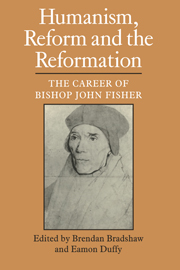Book contents
- Frontmatter
- Contents
- Preface
- List of abbreviations
- Bishop John Fisher, 1469–1535: the man and his work
- John Fisher and the promotion of learning
- The University chancellor
- The bishop in his diocese
- Fisher and Erasmus
- Fisher and More: a note
- The polemical theologian
- Fisher's view of the Church
- Fisher, Henry VIII and the Reformation crisis
- Royal ecclesiastical supremacy
- The spirituality of John Fisher
- Appendixes
- Index
John Fisher and the promotion of learning
Published online by Cambridge University Press: 04 August 2010
- Frontmatter
- Contents
- Preface
- List of abbreviations
- Bishop John Fisher, 1469–1535: the man and his work
- John Fisher and the promotion of learning
- The University chancellor
- The bishop in his diocese
- Fisher and Erasmus
- Fisher and More: a note
- The polemical theologian
- Fisher's view of the Church
- Fisher, Henry VIII and the Reformation crisis
- Royal ecclesiastical supremacy
- The spirituality of John Fisher
- Appendixes
- Index
Summary
John Fisher was a pastor and theologian to whom his University remained central throughout life: it provided indeed the chief arena of his influence and patronage. His standing within it as promoter, in company with the Lady Margaret Beaufort, of two new colleges, and as chancellor for life, was in marked contrast to his modest preferment in Church and state. His political and diplomatic service was limited to rare appearances at the king's council, the reception of ambassadors, and a journey to the Field of the Cloth of Gold in the suite of the queen. Richard Fox, who remained his constant friend and had first commended him to the king, was much more at the centre of affairs as councillor and keeper of the privy seal. Only after a long and busy civil career did Fox devote his main energies to Winchester and Oxford, where his new foundation of Corpus Christi College influenced Fisher's own plans for St John's College, Cambridge. Unlike Fox, Fisher was never bishop of a large and prestigious see, but held for life the poor see of Rochester, acquiring the reputation of a model bishop seldom away from his charge. On the other hand he was the chief link between the household of the Lady Margaret Beaufort and Cambridge University; in this sphere his labours were momentous and were publicly recognised by the University in its grant of exequies to him in 1529. He had directed the flow of the Lady Margaret's pious charity into the first successful endowed professorship, into the University preachership, and finally towards the foundations of Christ's and St John's.
- Type
- Chapter
- Information
- Humanism, Reform and the ReformationThe Career of Bishop John Fisher, pp. 25 - 46Publisher: Cambridge University PressPrint publication year: 1989
- 39
- Cited by



